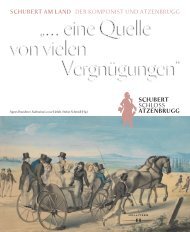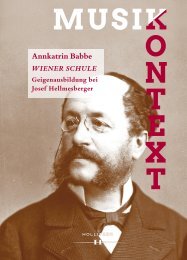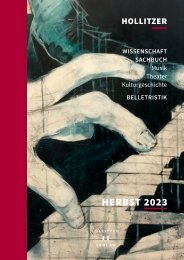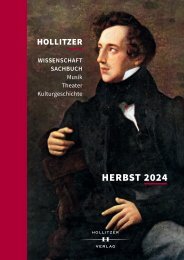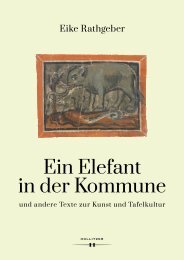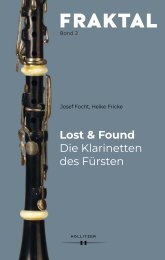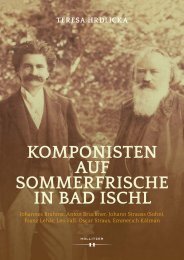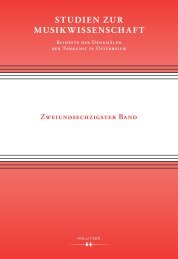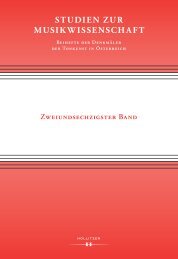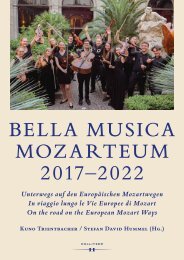Leseprobe_Henricus Isaac
You also want an ePaper? Increase the reach of your titles
YUMPU automatically turns print PDFs into web optimized ePapers that Google loves.
<strong>Isaac</strong>, Schubinger, and Maximilian in Pisa – A Window of Opportunity?<br />
at the Habsburg court, warmly recommended to Francesco Gonzaga the German<br />
lute player ‘virtuoso Augostino’ who, as he wrote, was much beloved by<br />
the whole court and who much delighted Maximilian. 15 However, Schubinger<br />
stayed at the Habsburg court as one of its most prominent musicians, with<br />
only an absence in 1500–6, when he was ‘lent’ by Maximilian to his son Philip<br />
the Fair in Brussels and Mechelen. In his double function as cornetto and lute<br />
player, he also undertook travels to Spain and back to Innsbruck and Augsburg<br />
with Philip’s Burgundian chapel, where he may have met again his Florentine<br />
colleague Alexander Agricola.<br />
No evidence indicates that Schubinger had accompanied Maximilian on the<br />
campaign to Italy in 1496. However, precisely because of his ‘economic’ dual<br />
function and in view of his Italian experience, it cannot be excluded that he<br />
would have been a fitting candidate for participation in a reduced music ensemble<br />
during the travel. Hence the very reasonable hypothesis that Schubinger<br />
may have arranged the encounter of Maximilian and <strong>Isaac</strong> in Pisa, about 80<br />
kilometres from Florence. Given our knowledge of habitual networks of musicians,<br />
we can assume that after his departure from Florence he had remained in<br />
contact (at least sporadically) with musicians who stayed behind in the town,<br />
including his former colleague <strong>Isaac</strong>, who was still resident there but presumably<br />
unemployed. It would have been by all means possible for Schubinger to<br />
inform <strong>Isaac</strong> about the king’s on-going musical reorganization and his travel<br />
to Italy. If Schubinger was not himself present in Pisa, one might imagine that<br />
written contacts with <strong>Isaac</strong> may have taken place beforehand. Or perhaps it<br />
was the other way around, and it was <strong>Isaac</strong> who approached Schubinger. Whoever<br />
took the initiative Schubinger would be an excellent advocate to convince<br />
Maximilian of <strong>Isaac</strong>’s outstanding quality and to make clear that hiring this<br />
singer-composer was an opportunity not to be missed. By so doing, Schubinger<br />
would have been able to kill two birds with one stone: he (re)gained a colleague<br />
who would likely continue to compose brilliant instrumental pieces, and he<br />
could repay an old debt – the support he received when <strong>Isaac</strong> had signed an act<br />
of guarantee on his behalf, when Schubinger had just arrived in Florence.<br />
Without doubt Maximilian was a music lover, and unquestionably he recognized<br />
the necessity to establish a representative court music, but to engage<br />
at a financially inauspicious time a singer who was not a priest and could not<br />
be funded through a benefice was far from a matter of course in 1496. It might<br />
have been his own wish to acquire a superb Flemish singer-composer who<br />
15 Letter from Innsbruck, January 31, 1500: Archivio di Stato, Mantua, AGonz, E/VI/3,<br />
busta 544, n. 1 (see RI XIV, 3,1 n. 9792). Instead, in 1502 Ulrich Schubinger jr. changed<br />
position from the Augsburg civic ensemble to the Mantuan court.<br />
7





